SAS Center
Start Date: 01 March 2013
End Date: 01 March 2014
Status: Ongoing
It is a specialized center in the technical field affiliated with the Department of Technology Ecosystem Development. It focuses on developing Tech and startups companies in the growth stage by working to improve the legislative environment, working with relevant entities from the public and private sectors to enhance the ecosystem of Tech startups, and providing a set of services to support them in commercial expansion.
Initiatives And Programs
1- Numo Program
This program aims to accelerate the growth of tech startups by providing services that scale their businesses.
Targeted Companies
- Seed Stage: Companies with a viable product and initial funding, showing signs of early success.
- Growth Stage: Companies with investment and a growing customer base, focusing on revenue growth, profitability, product development, and team expansion.
Services Offered
- Specialized consultations and workshops
- Promotional support
- Participation in exhibitions and events
- Business development opportunities
2- Jadara Program
The program aims to encourage the government entities to pilot and purchase the local startups products in ICT sector. In addition to support the entry of these products to the local market and contributes to the growth of ICT sector in Oman.
Offered Services
- Supporting startup to do Proof of Value (POV) to validate that the product will be useful for government entities. The ministry will facilitate the product testing for maximum 3 months.
- Taking any necessary actions and facilitations and coordinating between startups and targeted government entities.
- Promoting the locally developed products.
Target Segment
ICT startup that have developed tech products that target government entities directly or indirectly.
3- Sas48 Hackathon
A 48-hour hackathon where teams develop real-world solutions. Experienced mentors will guide and support the teams as they work through challenges and improve their projects. At the end, each team will present their solutions to a panel of judges and explore the innovations of other participants. The top 3 teams will be announced on the final day and will receive six months of additional support to further develop their business models.
Target segments
University students, job seekers, and employees
Objectives
- Encourage innovation by providing a platform to test and validate new tech ideas.
- Transform conceptual ideas into working prototypes for challenge solutions.
- Actively promote and Foster a culture of entrepreneurship
4- Startup Ecosystem Development Initiative
A set of programs and initiatives aim to improve startup ecosystem in Oman through a specific methodology that measures performance development.
Objectives
- Improving the tech environment and enhancing startup ecosystem in Oman.
- Aligning efforts and work with other relevant entities in different projects and initiatives to enhance startup ecosystem.
- Provide the necessary support for the startups to maximize their development opportunities by holding events that enhance the networking with startups and investors.
Key Initiatives
- Startup Ecosystem Heatmap
- Oman Startup Platform (OSH)
5- Consultation Hours
60-minute sessions for tech companies, startups and aspiring entrepreneurs to receive guidance. Bookings can be made through the SAS website.
6- ICT Sector Local Content Stimulation Program
The Ministry of Transport, Communications, and Information Technology is implementing the ICT Sector Local Content Stimulation Program as part of its efforts to enhance local content and integrate roles between public and private sector institutions. This initiative aligns with Oman Vision 2040, which aims to promote sustainable employment for citizens and improve the integration of Omani goods and services into the procurement processes of local companies, contributing to their growth and expansion.
Objectives
- Increase the percentage of local content in ICT government contracts.
- Localize industries and services, identifying market opportunities for SMEs.
- Support local companies in expanding locally and internationally.
- Create a monitoring mechanism for local content in the ICT sector.
Terms
Local content
The added value to the national economy resulting from the use of local content elements.
Local content elements
These are production components consisting of the workforce, national and local products, fixed assets, the development of small and medium enterprises, and others.
National product
The local product that has obtained the National Product Identity from the Ministry of Commerce, Industry, and Investment Promotion.
Local product
the good or service manufactured within the Sultanate of Oman.
Mandatory Goods List
Classified goods that are added to the mandatory list issued by the General Secretariat of the Tender Board and are required to be used in the contract, including registered local and national technology.
Local content plan
A plan that outlines the targets for local content elements at all stages of the project.
Made in Oman
A product, material, or equipment listed in the Omani origin goods list issued by the Ministry of Commerce, Industry, and Investment Promotion (link).
Micro, small, and medium enterprises
any micro, small, or medium institution registered with the Small and Medium Enterprises Development Authority and the General Secretariat of the Tender Board in the Sultanate of Oman.
Tech and startup companies
Any startup company registered with the Small and Medium Enterprises Development Authority and holding a startup entrepreneurship card.
Gulf tech companies
These are companies that have a commercial registration from one of the Gulf Cooperation Council countries and are active.
International tech companies
These are companies that have a commercial registration from outside the Sultanate and the active Gulf countries.
Freelancers
They are independent business owners who rely on their personal skills, abilities, and knowledge to complete tasks and possess a valid Omani commercial registration.
Localisation of technology
It is the process of transferring technical knowledge in a way that aligns with local needs by developing competencies, and enhancing research, innovation, design, development, and local manufacturing from global technologies.
Mandatory services list
Classified services that are added to the mandatory list issued by the General Secretariat of the Tender Board and are mandatory to use in the contract, including registered local technology.
Tech Companies Directory
A list affiliated with the Ministry of Transport, Communications, and Information Technology that includes information about telecommunications and information technology companies registered commercially in the Sultanate (link).
Developing local suppliers
These are the activities that the contractor plans to provide to suppliers from small and medium-sized enterprises registered locally in relation to contract execution during the contract period. Among these activities that the contractor undertakes to improve the standards and efficiency of its suppliers to enhance the quality of their products or services and localise technology, as well as the activities the contractor undertakes to develop and train the suppliers' workforce.
Locally registered companies
These are companies that have an active Omani commercial registration.
Local content regulations for government tenders in the field of telecommunications and information technology
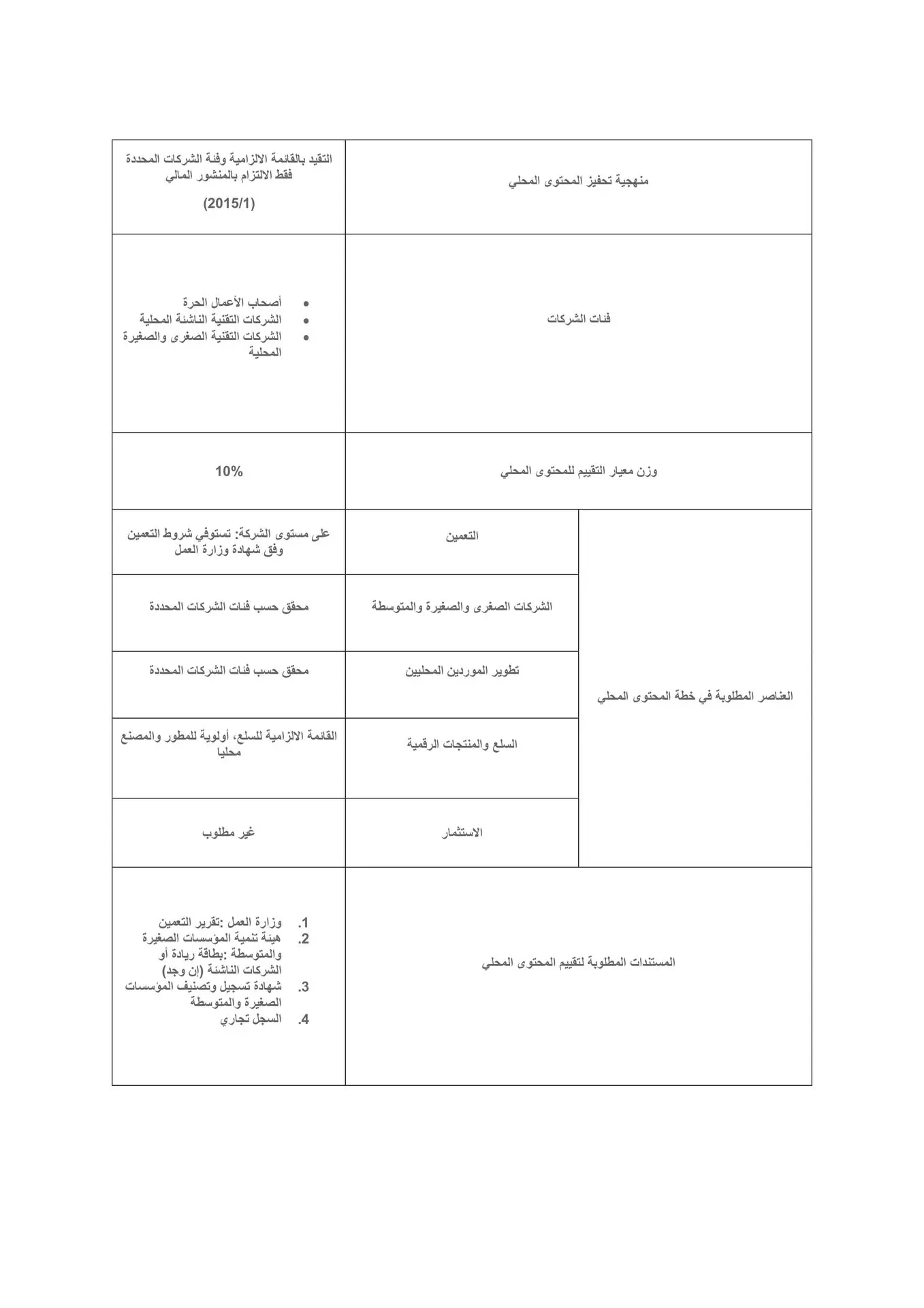
1) Project budget in Omani Rial (1-25 thousand Omani Rial)
2) Project budget in Omani Rial (25,001 – 50,000 Omani Rial)
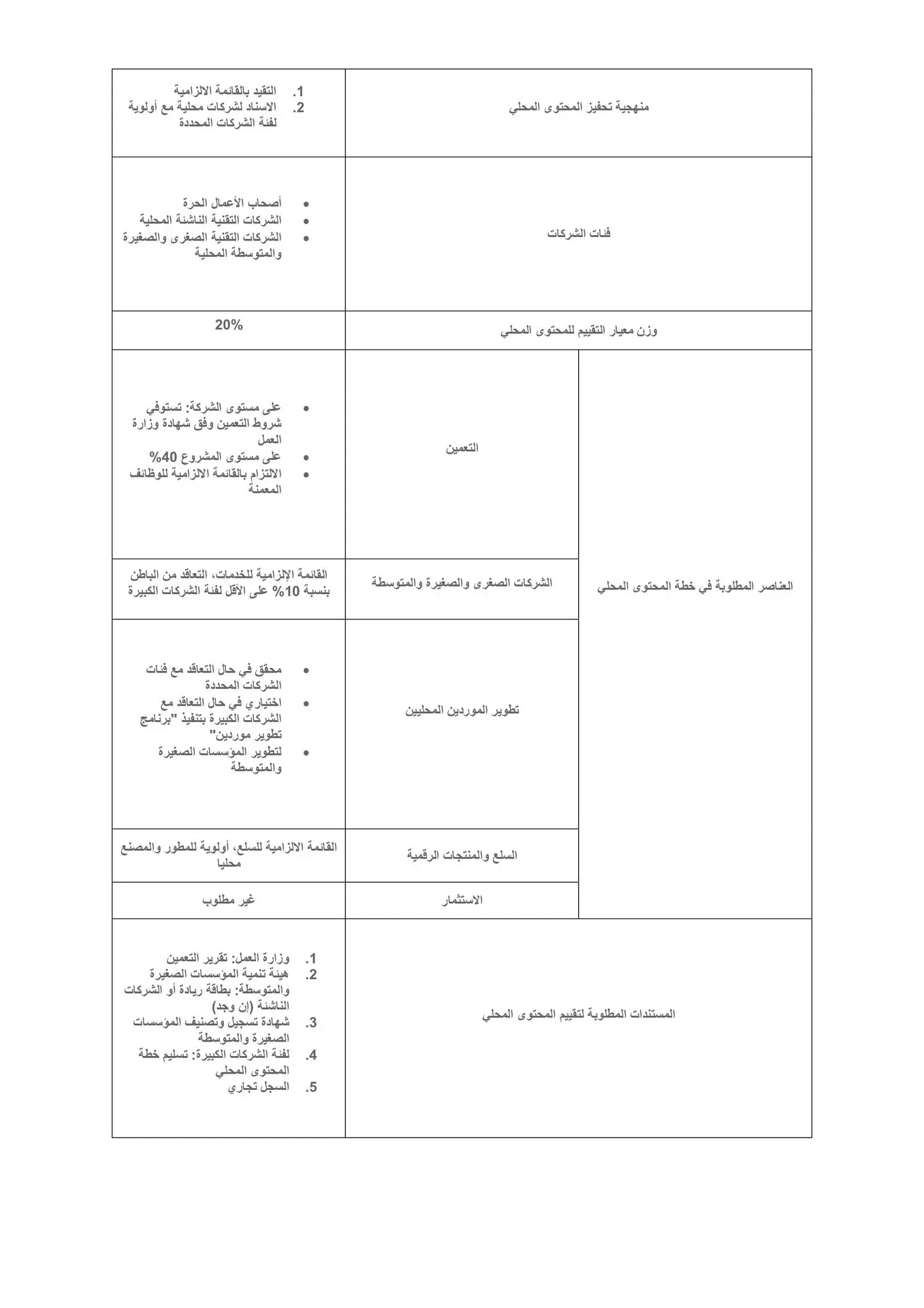
3) Project budget in Omani Rial (50,001 - 250,000 Omani Rial)
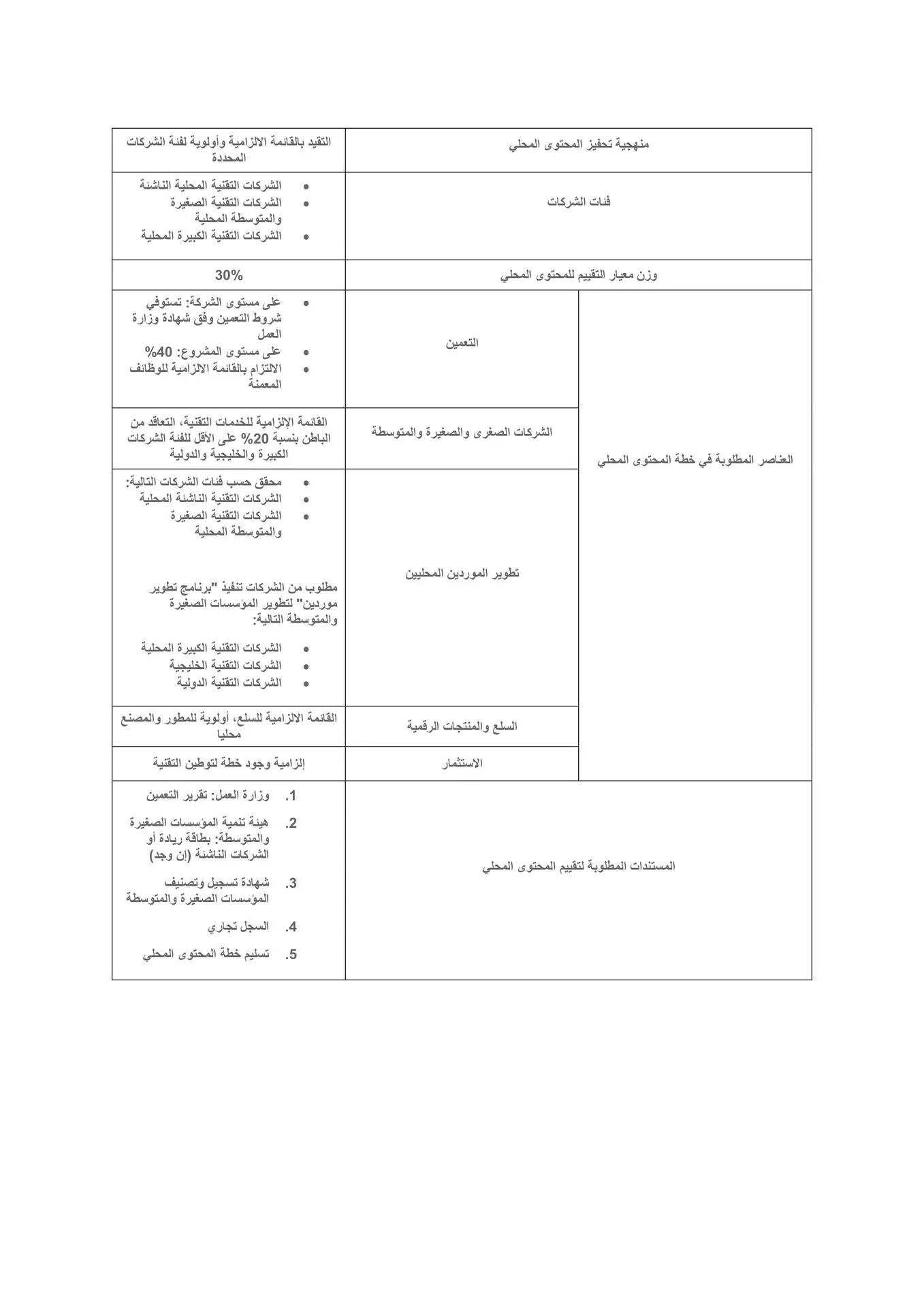
5) Project budget in Omani Rial (above 3 million Omani Rial)
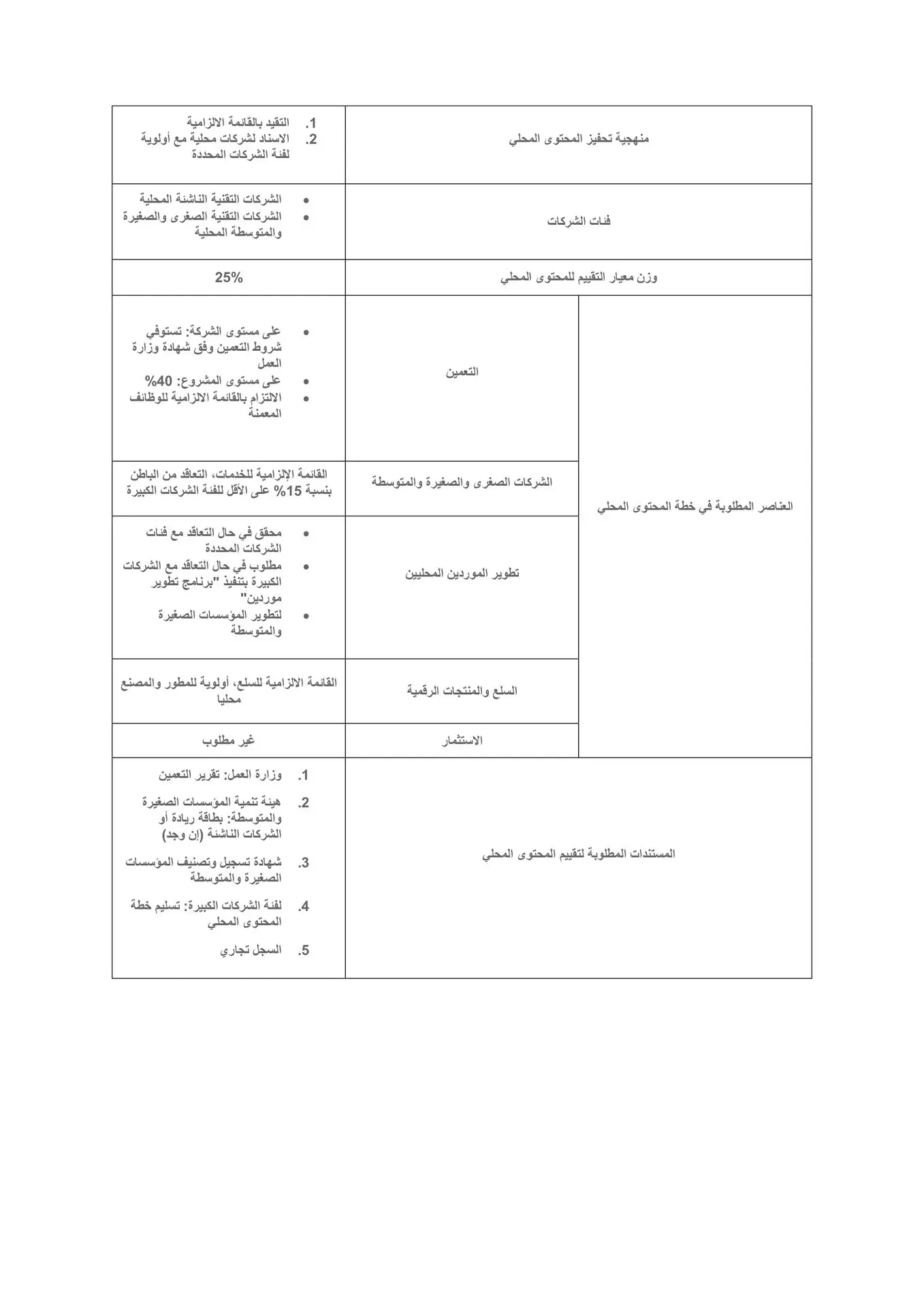
4) Project budget in Omani Rial (250,001 – 3 million Omani Rial)
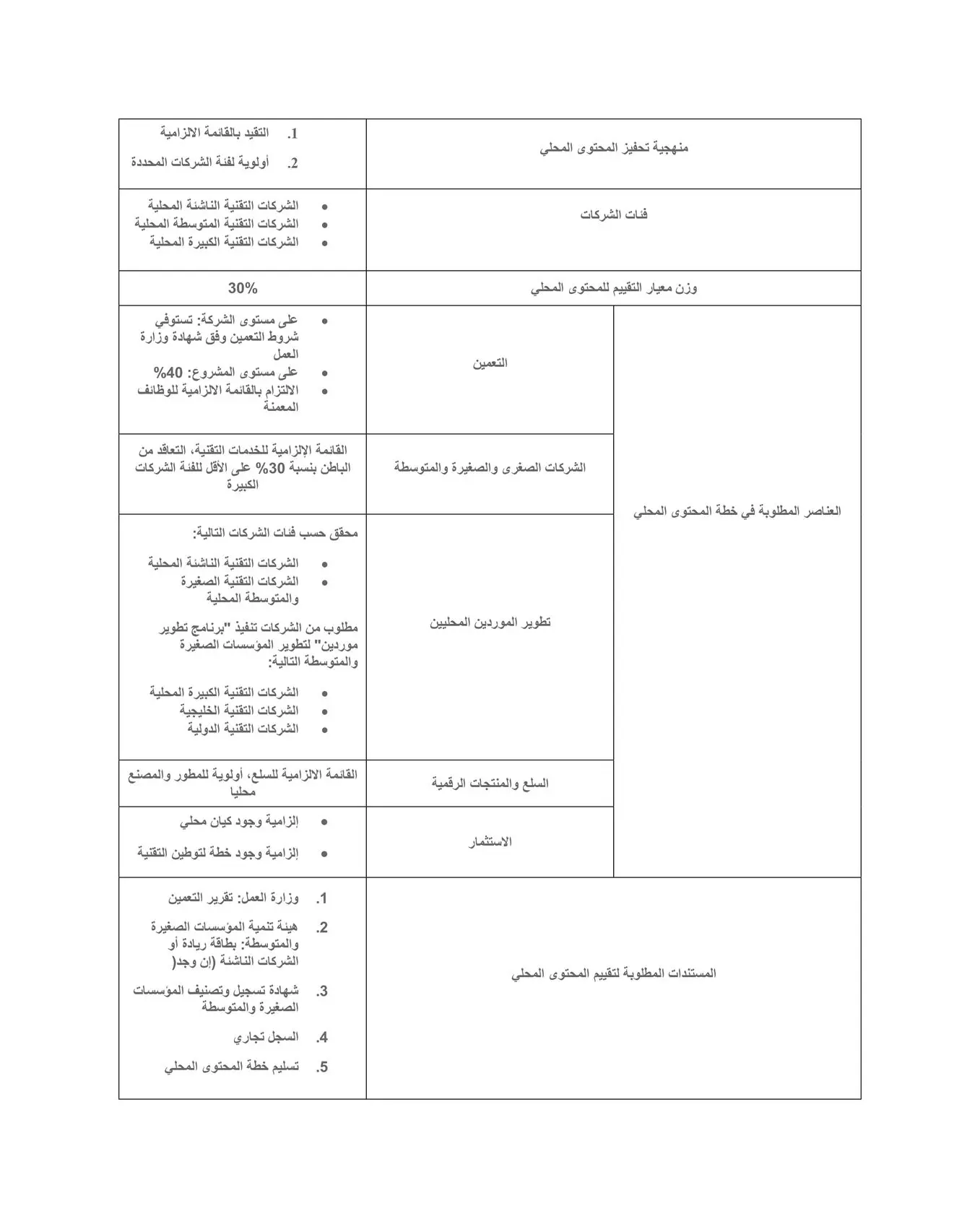
Local content regulations for government tenders in the field of telecommunications and information technology
1) Project budget in Omani Rial (1-25 thousand Omani Rial)

2) Project budget in Omani Rial (25,001 – 50,000 Omani Rial)
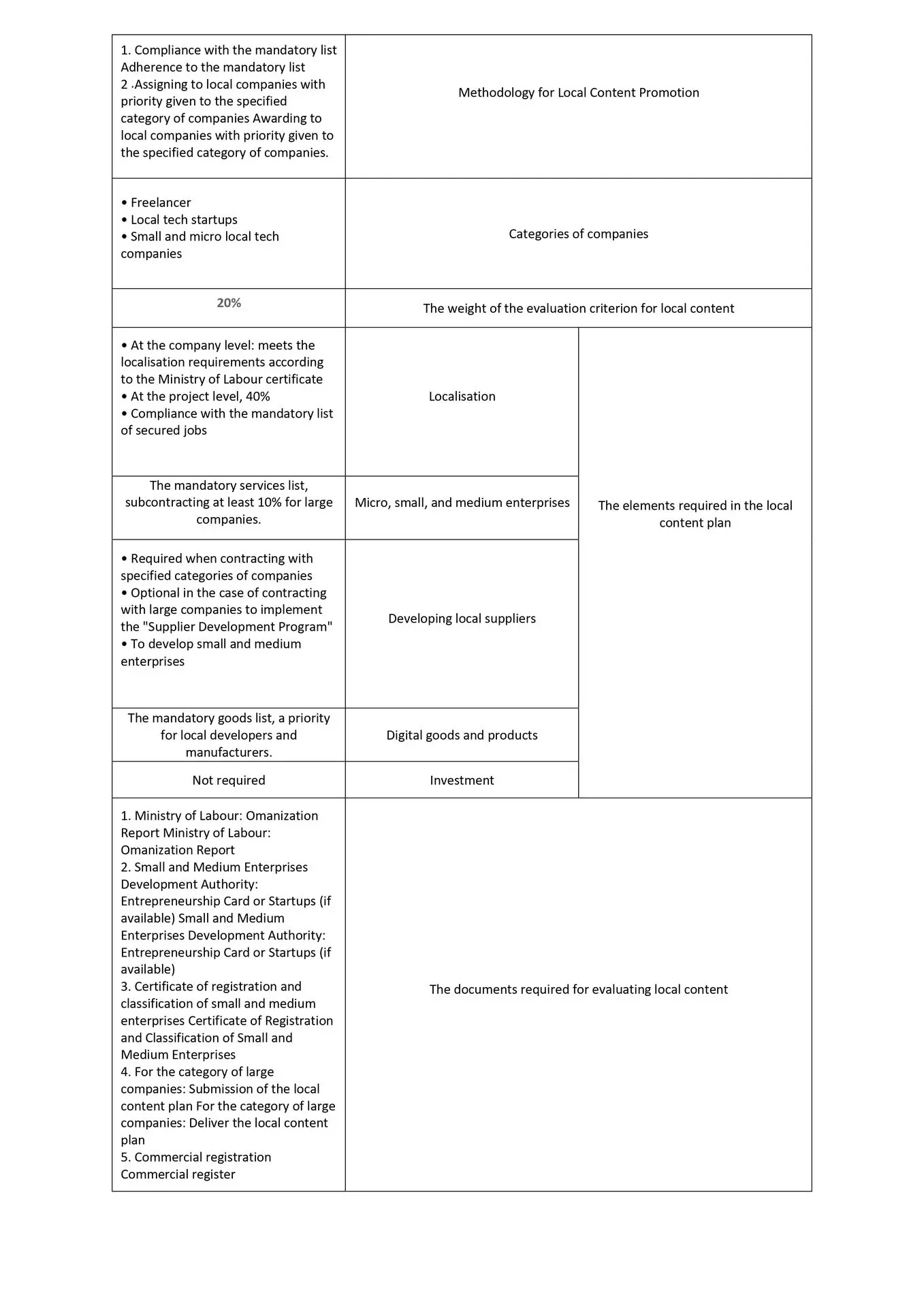
3) Project budget in Omani Rial (50,001 - 250,000 Omani Rial)

4) Project budget in Omani Rial (250,001 – 3 million Omani Rial)
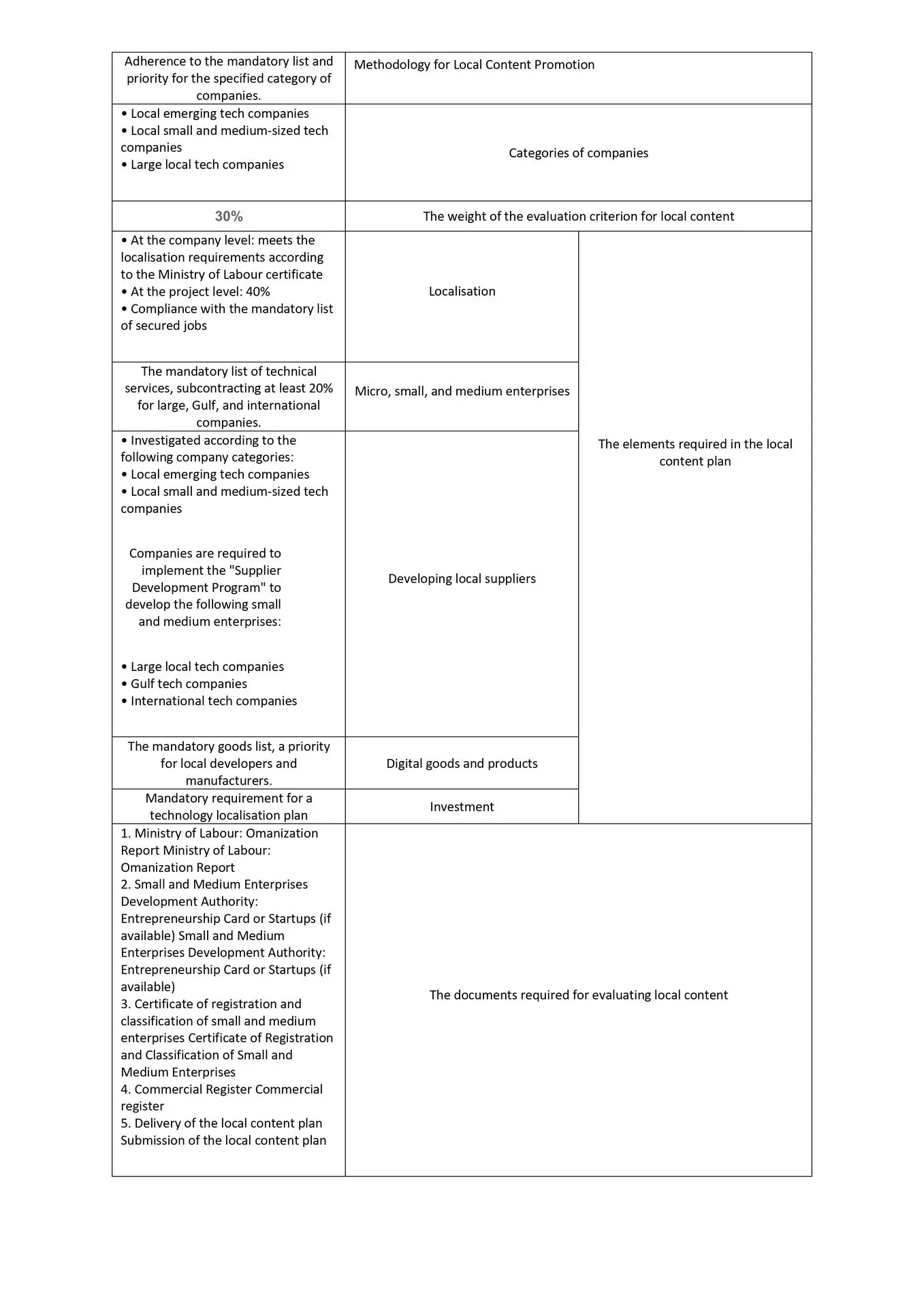
5) Project budget in Omani Rial (above 3 million Omani Rial)
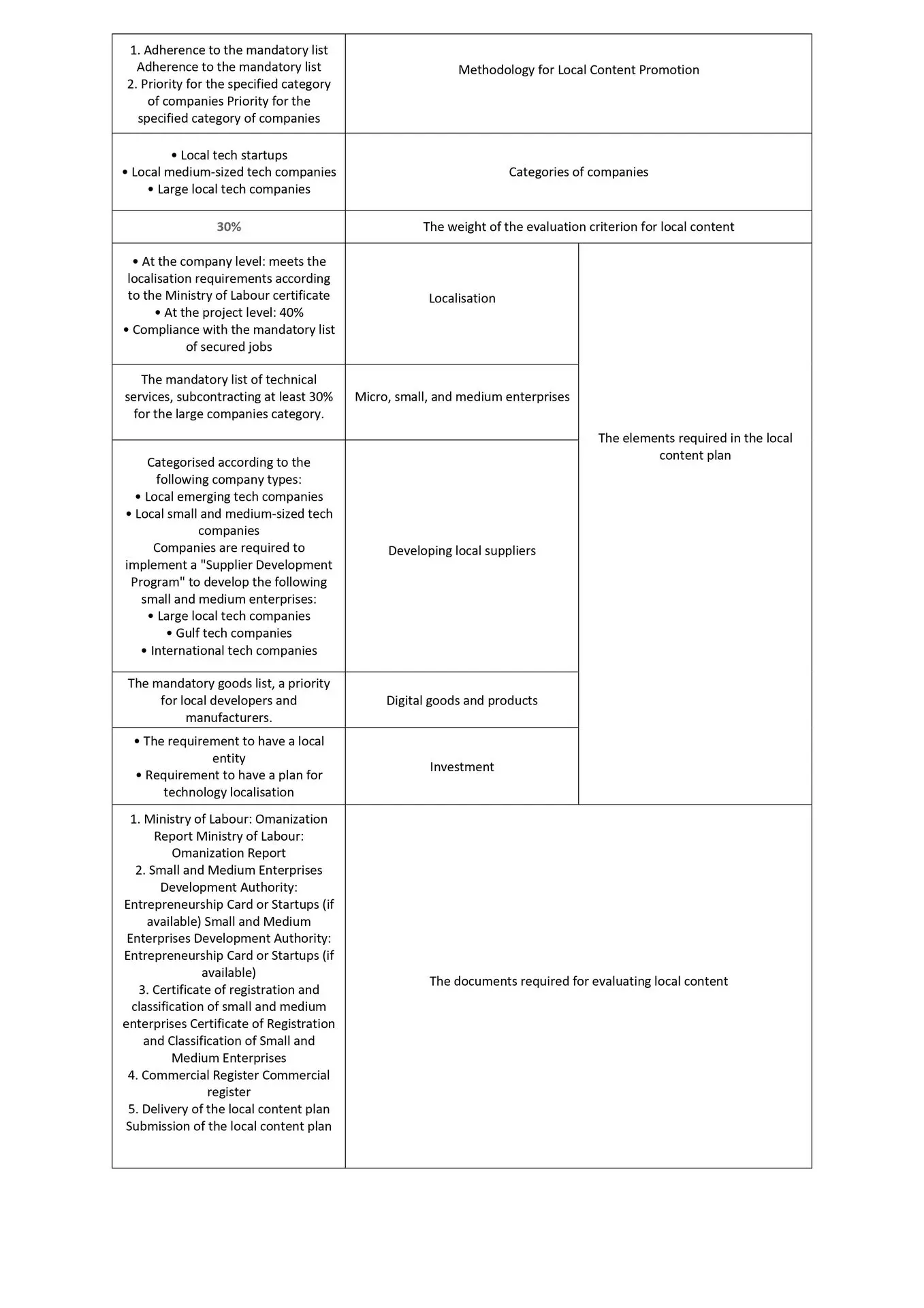
- The exception to this applies to companies that are directly assigned, such as those providing software licenses, with the necessity to negotiate and agree on a mechanism, methodology, and the size of investment in local content
Example of Applying Local Content Regulations in the Tender Document (Tender Form)
This practical example demonstrates how local content elements are incorporated into the tender document, serving as a reference for applying local content regulations when preparing tenders;
|
Tender Name |
Estimated Value |
|
Supply and Installation of Systems and Spare Parts for One of the Centers |
330,000 OMR |
Table No. 1: Tender Example
In the tender document, the evaluation criteria distribution must total 100%, divided into:
- Technical Evaluation Criteria (which includes local content)
- Financial Evaluation Criteria
Step 1:
Project managers and local content specialists in government entities work on the tender document to define the weight of the technical and financial criteria. In this tender, the weights are defined as follows:
- Technical: 60%
- Financial: 40%
Step 2:
When working on the technical evaluation, the project manager refers to the Local Content Regulations Table for government tenders in the ICT sector. Based on the defined project budget, the following are determined:
- The appropriate methodology to be followed in the tender.
- The weight assigned to local content in the evaluation criteria.
- The required elements in the local content plan.
In this example:
Since the project budget is OMR 330,000, the methodology for projects valued between 250,000 – 3,000,000 OMR must be applied, and the weight assigned to the local content evaluation criterion is 30%, which forms part of the technical evaluation, as shown in the following table:
|
No. |
Technical Evaluation Criteria |
Weight % |
|
1 |
Experience in the same field of work |
5 |
|
2 |
Compliance with the scope of work |
35 |
|
3 |
Methodology and approach to work execution |
5 |
|
4 |
Delivery and installation timeline |
5 |
|
5 |
Testing, support, and warranty |
5 |
|
6 |
Team composition and CVs of key staff |
5 |
|
7 |
Documentation, knowledge transfer, and training |
5 |
|
8 |
Compliance with Ministry’s terms and conditions of contract |
5 |
|
9 |
Local content evaluation |
5 |
|
|
Total |
100 |
Table No. 2: Technical Evaluation Criteria
Step 3:
Local content criteria are addressed in detail by adding the local content elements to achieve the weight allocated to local content in the current example (30%), as shown in Table No. 3.
The following steps illustrate the process:
Local content elements include:
1. Omanization
- At the company level: compliance with Omanization requirements according to the Ministry of Labour certificate.
- At the project level (in this project: 40%).
- Commitment to the mandatory list of Omanized jobs.
2. Micro, Small, and Medium Enterprises (MSMEs)
- Compliance with the mandatory list, with priority given to the specified categories.
- In this tender, the award goes to local companies with priority given to the specified categories: local tech startups, local micro, small, medium, and large tech companies.
- If contracting with large, Gulf, or international tech companies, a minimum of 20% subcontracting must be awarded to the specified categories.
3. Local Supplier Development
-Achieved: if contracting with the following categories:
- Local tech startups
- Local small and medium tech companies
-Not Achieved (Required): companies must implement a Vendor Development Program if they belong to the following categories:
- Local large tech companies
- Gulf tech companies
- International tech companies
4. Digital Goods and Products
- Compliance with the mandatory list of goods, with priority for locally developed and manufactured products (the list is currently being prepared).
5. Investment
- Not required for the specified budget.
|
No. |
Local Content Evaluation Criteria |
Weight % |
|
1 |
Submission of a local content plan covering all required elements |
2 |
|
2 |
Compliance with the requirement of appointing a Local Content Manager responsible for implementation |
2 |
|
3 |
Omanization: At the company level: compliance with Omanization requirements as per the Ministry of Labour certificate At the project level: 40% (including subcontractors) Commitment to the mandatory list of Omanized jobs |
10 |
|
4 |
Micro, Small and Medium Enterprises (MSMEs) Mandatory list for ICT services: at least 20% subcontracting to SMEs when contracting with large companies |
6 |
|
5 |
Local Supplier Development Achieved when contracting with the following categories:
Required: companies must implement a Vendor Development Program to develop SMEs when contracting with:
|
5 |
|
6 |
Digital Goods and Products Mandatory goods list, with priority for locally developed and manufactured products |
3 |
|
7 |
Investment Mandatory requirement to provide a Technology Localization Plan |
2 |
|
Total |
30 |
Table No. 3: Tender Example
It must be ensured that the local content elements listed in the table above are aligned with the main Local Content Framework table.
It must be clearly stated in the tender document that:
- Any bids that do not meet the local content requirements will be excluded.
To view the Local Content Enablement Framework for the ICT sector, click here
For inquiries: tahfeez.tech@mtcit.gov.om
Contact Information of SAS Center
Phone and WhatsApp: +968 24166420
Email: Sas@mtcit.gov.om
Website: www.Sas.om
Related Projects
Discover NowArtificial Intelligence Studio (Phase One)
Start Date: 28 January 2025
End Date: 31 January 2025
Status: Completed
Artificial Intelligence and Future Skills Program
Start Date: 28 January 2025
End Date: 31 January 2025
Status: Completed
Strategic Partnership to Enhance Oman’s Digital Position
Start Date: 19 May 2025
End Date: 19 May 2025
Status: Completed
Sandboxes Ecosystem
Status: In Progress
